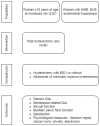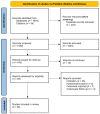Quality of Life after Risk-Reducing Hysterectomy for Endometrial Cancer Prevention: A Systematic Review
- PMID: 36497314
- PMCID: PMC9736914
- DOI: 10.3390/cancers14235832
Quality of Life after Risk-Reducing Hysterectomy for Endometrial Cancer Prevention: A Systematic Review
Abstract
Background: Risk-reducing hysterectomy (RRH) is the gold-standard prevention for endometrial cancer (EC). Knowledge of the impact on quality-of-life (QoL) is crucial for decision-making. This systematic review aims to summarise the evidence.
Methods: We searched major databases until July 2022 (CRD42022347631). Given the paucity of data on RRH, we also included hysterectomy as treatment for benign disease. We used validated quality-assessment tools, and performed qualitative synthesis of QoL outcomes.
Results: Four studies (64 patients) reported on RRH, 25 studies (1268 patients) on hysterectomy as treatment for uterine bleeding. There was moderate risk-of-bias in many studies. Following RRH, three qualitative studies found substantially lowered cancer-worry, with no decision-regret. Oophorectomy (for ovarian cancer prevention) severely impaired menopause-specific QoL and sexual-function, particularly without hormone-replacement. Quantitative studies supported these results, finding low distress and generally high satisfaction. Hysterectomy as treatment of bleeding improved QoL, resulted in high satisfaction, and no change or improvements in sexual and urinary function, although small numbers reported worsening.
Conclusions: There is very limited evidence on QoL after RRH. Whilst there are benefits, most adverse consequences arise from oophorectomy. Benign hysterectomy allows for some limited comparison; however, more research is needed for outcomes in the population of women at increased EC-risk.
Keywords: Lynch syndrome; decision regret; endometrial cancer prevention; hysterectomy; menopause; quality of life; risk reducing hysterectomy; satisfaction.
Conflict of interest statement
R.M. declares research funding from Barts & the London Charity, Rosetrees Trust, Eve Appeal, GSK, BGCS, outside this work, an honorarium for grant review from Israel National Institute for Health Policy Research and honorarium for advisory board membership from Astrazeneca/Merck Sharp & Dohme/Everything Genetics limited. The funders had no role in the design of the study; in the collection, analyses, or interpretation of data; in the writing of the manuscript; or in the decision to publish the results.
Figures
References
-
- Moller P., Seppala T.T., Bernstein I., Holinski-Feder E., Sala P., Gareth Evans D., Lindblom A., Macrae F., Blanco I., Sijmons R.H., et al. Cancer risk and survival in path_MMR carriers by gene and gender up to 75 years of age: A report from the Prospective Lynch Syndrome Database. Gut. 2018;67:1306–1316. doi: 10.1136/gutjnl-2017-314057. - DOI - PMC - PubMed
-
- Johnatty S.E., Tan Y.Y., Buchanan D.D., Bowman M., Walters R.J., Obermair A., Quinn M.A., Blomfield P.B., Brand A., Leung Y., et al. Family history of cancer predicts endometrial cancer risk independently of Lynch Syndrome: Implications for genetic counselling. Gynecol. Oncol. 2017;147:381–387. doi: 10.1016/j.ygyno.2017.08.011. - DOI - PubMed
Publication types
Grants and funding
LinkOut - more resources
Full Text Sources



